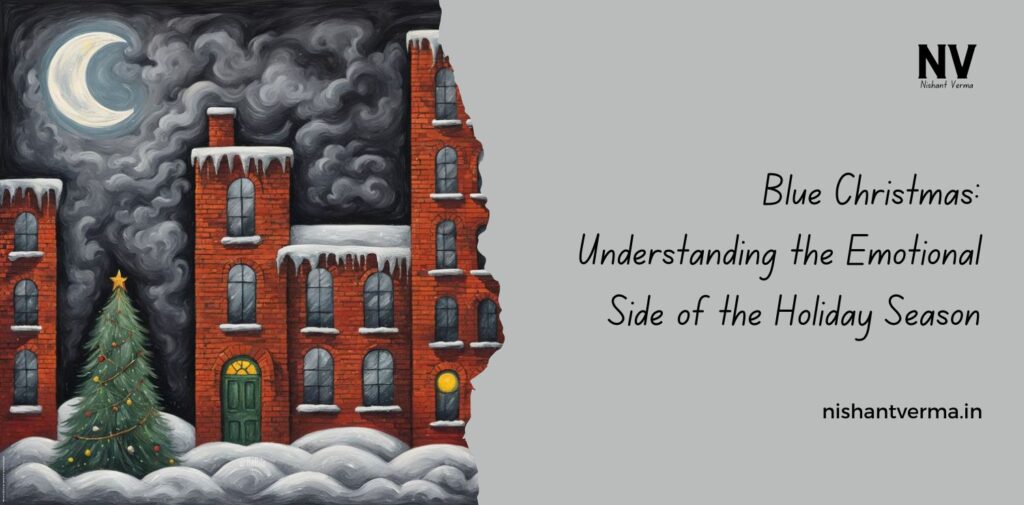Christmas is often seen as a time of joy, celebration, and togetherness. The holiday brings with it a sense of warmth, as families gather, decorations fill the streets, and festive music fills the air. However, for some people, Christmas can also bring feelings of sadness, loneliness, or a sense of loss. This emotional contrast between the bright celebrations and feelings of melancholy is referred to as a “Blue Christmas.”
In this article, we will discuss what a Blue Christmas means, why it can affect people, and how we can address these feelings. Understanding Blue Christmas is especially important for Indian audiences because, while Christmas is a widely celebrated holiday in India, it is not always experienced in the same way by everyone. Some people might feel the emotional impact of the season more deeply due to personal challenges, cultural differences, or different social dynamics.
What is a Blue Christmas?
A Blue Christmas refers to a Christmas holiday that is marked by feelings of sadness, depression, or loneliness, rather than the usual happiness and excitement associated with the festive season. The term “blue” here is used as a metaphor for sadness or melancholy, much like the term “feeling blue” is commonly used in English to describe sadness.
This feeling can arise from many different sources. For example, some people may experience the loss of a loved one during the holiday season, which brings on feelings of grief. Others may feel lonely because they are far away from family and friends, or because they don’t have the social connections they wish for. Financial struggles, family conflicts, and unmet expectations can also contribute to the feeling of a Blue Christmas.

Why Do Some People Feel a Blue Christmas?
While Christmas is a time of celebration, the reality is that the holiday season can bring up a lot of emotions, especially if someone is dealing with difficult circumstances. Here are some of the reasons why some people may experience a Blue Christmas:
- Loss of a Loved One: Christmas is a time when families come together to celebrate, making it particularly difficult for those who have lost a loved one. The absence of a spouse, parent, child, or friend during the holidays can trigger feelings of grief and sorrow. The empty chair at the table or the missing presence during family traditions can make the holiday season feel even more painful.
- Loneliness and Isolation: In a country as diverse and large as India, many people may be separated from their families during Christmas due to work, studies, or other reasons. Living away from home, especially in big cities like Mumbai, Bengaluru, or Delhi, can sometimes result in feelings of loneliness. For those who don’t have close friends or family nearby, the festive celebrations around them can emphasize their isolation.
- Financial Stress: The pressure to buy gifts, throw parties, and attend festive events can cause financial stress for many people. In India, where many individuals and families live paycheck to paycheck, the holiday season’s expensive demands can add extra strain. This can lead to feelings of inadequacy or worry about not being able to celebrate in the “traditional” way.
- Unmet Expectations: Many people enter the holiday season with high expectations of joy, togetherness, and happiness. However, when these expectations aren’t met—whether due to family conflicts, difficult circumstances, or personal challenges—it can lead to disappointment. The idealized version of Christmas portrayed in movies, advertisements, and social media can create unrealistic expectations that lead to frustration when things don’t go as planned.
- Cultural and Social Differences: In India, Christmas is widely celebrated, particularly in states with large Christian populations such as Kerala, Goa, and parts of Northeastern India. However, for many people, Christmas may not have the same emotional significance or cultural relevance. For some, the holiday season may simply be a time of celebration with friends and family, without a deep connection to religious or personal traditions. As a result, people may not fully connect with the festive spirit, leaving them feeling disconnected or left out.

How Blue Christmas Affects People in India
India is a country with diverse cultural traditions and religious practices, and the way Christmas is celebrated can vary widely. While Christmas is a public holiday in many parts of the country and is observed with great enthusiasm, especially in urban areas, not everyone experiences the holiday in the same way. Here are some ways a Blue Christmas may affect people in India:
- Disconnection from Family: In India, Christmas is often a family-centered holiday. Many people travel long distances to be with their families during the festive season. However, with a large number of young adults working or studying in cities far from home, the sense of togetherness during the holiday season can be lost. This can be particularly difficult for those who feel disconnected from their roots, whether due to geographical distance or a change in family dynamics.
- Urban Isolation: In India’s rapidly growing cities, people often find themselves far away from their home towns, sometimes living in shared apartments or paying guest accommodations. These arrangements can be lonely, especially during the holidays. While the festive lights and decorations may fill the city with cheer, some individuals may find themselves struggling to find companionship during this time.
- Pressure to Celebrate: In a diverse and vibrant country like India, where community events and family gatherings are an important part of the culture, there is often pressure to “celebrate properly.” For people who don’t have the resources, support system, or desire to partake in these celebrations, the pressure to keep up can add to the sense of sadness. Social media can exacerbate this feeling, as it often showcases others enjoying lavish celebrations, which may make people feel as if they are missing out.

How to Cope with a Blue Christmas
If you are experiencing a Blue Christmas, it’s important to know that you’re not alone. Many people around the world, including in India, face emotional challenges during the holiday season. However, there are ways to cope and find peace, even during difficult times.
- Acknowledge Your Feelings: It’s important to accept and acknowledge your feelings of sadness or loneliness. It’s okay to feel down during the holiday season—it doesn’t make you any less of a person. Recognizing your emotions can be the first step toward understanding why you feel the way you do and taking steps to address it.
- Connect with Loved Ones: Even if you can’t be physically present with family or friends, try to connect with them in other ways. Video calls, phone calls, or even sending heartfelt messages can help you feel closer to the people you care about. In India, many people use digital platforms like WhatsApp, Zoom, or Skype to bridge the distance during the holiday season.
- Find New Traditions: If old traditions are too painful, consider creating new ones that bring you joy. This could mean spending time volunteering, doing something creative, or even just relaxing in a way that makes you feel at peace. In India, Christmas celebrations can often be centered around community service, such as distributing food or clothes to those in need. Engaging in acts of kindness can be incredibly uplifting.
- Take Care of Your Mental Health: During this time, it’s essential to prioritize self-care. Take time for yourself to relax, recharge, and reflect. Engage in activities that bring you comfort, whether it’s reading a book, practicing meditation, or taking a walk. If feelings of sadness persist, it may be helpful to speak to a counselor or therapist who can help you navigate your emotions.
- Focus on Gratitude: While it’s easy to focus on what’s missing, try to shift your focus toward the things you are grateful for. Reflect on the positive aspects of your life—whether it’s good health, supportive friends, or simple moments of peace. Practicing gratitude can help change your perspective and ease feelings of sadness.
Conclusion
A Blue Christmas is an experience that many people face during the holiday season, and it’s important to recognize that it’s okay to feel this way. For those in India, where the festive spirit is often strong, the pressure to feel joyous can be overwhelming. However, understanding the emotional side of Christmas and taking steps to cope with feelings of loneliness, loss, or stress can make a significant difference.
By acknowledging our emotions, connecting with others, and creating new traditions, we can navigate through the sadness and embrace the season in a way that feels right for us. Remember, Christmas is not just about grand celebrations; it’s about finding peace, love, and compassion in whatever form it takes for each person.




